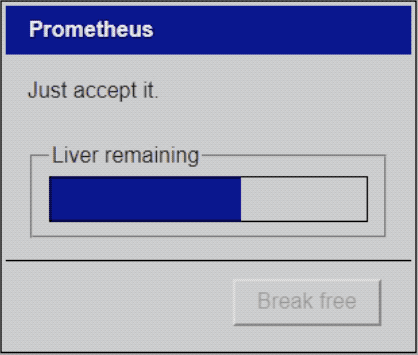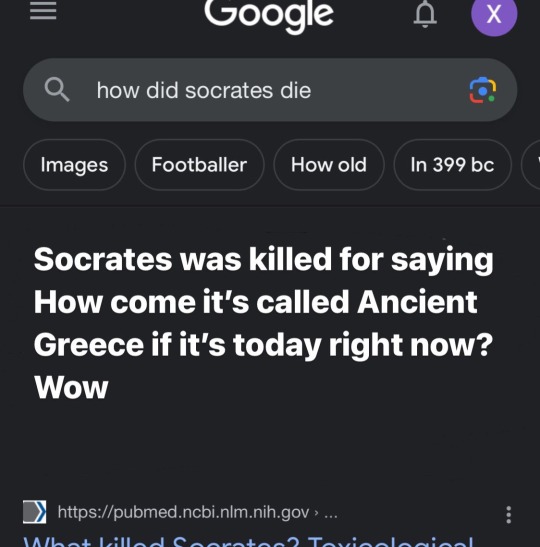Note
re: trans history recs- i’d recommend Trans Historical: Gender Plurality before the Modern! The journal Early Modern Cultural Studies also has a special edition (19.4) on early modern trans history. They’re focused on medieval/early modern- but they’re helpful reads for how to approach trans history
thank you!! i'll take a look.
7 notes
·
View notes
Text
would it be rude of me to start blocking people who are mean to socrates in the tags of my posts. genuine question
#mod felix#like. people who are reblogging my posts off other people's blogs to be clear. not current followers#sorry mod sarah. i <3 blocking people#eurgh except i need to go through and unblock all those bots... our blocklist is like 60% bots 40% terfs
11 notes
·
View notes
Text
alternate universe where everything is the same except they put diogenes in bill and ted's excellent adventure instead of socrates
63 notes
·
View notes
Text
Tips for Spotting Bad & Bullshit History
There's no way to make sure you never fall for historical misinformation, and I'm not expecting anyone to fact-check every detail of everything they read unless they're getting paid for it. But you can make an effort to avoid the Worst Takes.
Ask yourself – if I wanted to verify this, where would I start? If you look at a statement and can’t actually find any facts to check, then you already know it’s bullshit.
Read the Wikipedia article on weasel words. Some experts say it’s very helpful!
Look for specifics: a who, a what, a where, a when. If one of those is missing or very broad, that’s a red flag. Statements need to be rooted in a time and a place. “People in the past have always…” Nope.
Vague is bad. Unless you’re looking at a deliberate large-scale overview that’s being broad and generalizing on purpose, you want names and dates and places and primary sources, pictures and quotes and examples.
But an example is not a trend. There’s a difference between what’s possible and what’s common, and history is full of exceptions and outliers. Extremely unusual people and events are overrepresented in the historical record (because nobody writes down what’s normal,) and they can tell us a lot about history, but they’re not directly representative of their place or time. Imagine a historian trying to reconstruct the 21st century based solely on Kiwifarm.
If a historian is competent or even just trying, you won’t have to go digging for sources, they will be shoved right into your face. Not out of mere academic rigor, but because a person who found them, either first- or second hand, is proud to have found them. People who have proof want to show you the proof, people who figured something out will want to show you their work, walk you through it. If they don’t, ask yourself – how do you know this? And - why won’t you tell me how you know this?
Someone might have a legit historical source, and then try to stretch it to cover times and places where it no longer applies. What’s true of 12th century England may not be true of 14th century Venice, even though both are “Medieval Europe,” so watch for those stretches.
Anecdotes are fine, they reveal a lot about people’s values and perceptions, pro historians often use them for context, but what anecdotes are not is factual truth. Notice when someone is feeding you cute anecdotes.
If someone attributes a large-scale social or cultural transformation to a single person or event, yeah that’s usually bullshit. Chances are, that person was part of a larger trend, a small link in a long chain. You can still appreciate their contribution, just put it in context!
Second-guess anyone who acts like they possess secret knowledge that the Media or Academia (or somebody) is hiding, they’re usually bullshit. Remember, if something has a Wikipedia article, it’s not actually a dark secret.
Remember that if it happened in the past sixty years, tons of people will still remember it, and you can literally just go and ask them.
Learn to recognise a smear tactic. Did this person really fuck dogs, or was their posthumous biography written by their worst enemy? Should we take it at face value? Also learn to recognise overt propaganda in the opposite direction: is the king that great or does he have a court historian on retainer? Remember that people sometimes *lie* in their autobiographies.
It’s fine to speculate about what “could” or “might” have happened, professional historians also fill the gaps in the sources with the occasional educated guess. But failing to differentiate clearly between fact and speculation is a huge mistake.
Do not seek validation in history. It's not there. I’m not saying you should approach history in an impersonal, apolitical way, of course not. Our present situation influences our interpretation of history, and it should. What I’m saying is, try not to hang too much of your individual or group identity on a historical narrative. Especially if it’s bullshit. You’re worthy and human because you’re worthy and human today, not because of the deeds and misdeeds of people in the past.
2K notes
·
View notes
Text
the problem i'm having is that there's a lot about gender and translation theory but it's all about like... "feminist" translation and if lgbtq/queer stuff is mentioned it usually focuses more on sexuality but i'm not really worried about "feminism" i just want to read about how you decide which pronouns to use when it's ambiguous in the source text/when the source language doesn't rely as heavily on gendered pronouns
does anyone have recommendations for translation theory by/for/about trans people. especially as it relates to roman/greek literature. i'm dying out here
#mod felix#some of the stuff i'm finding is like. useful for that. but it's like. not hitting what i actually want/need to talk about
43 notes
·
View notes
Text
does anyone have recommendations for translation theory by/for/about trans people. especially as it relates to roman/greek literature. i'm dying out here
#mod felix#i've barely started looking but like. what i've got is not the most useful#oh especially from a transfem perspective.#even resources about like. gendering historical figures/applying lgbtq+ labels to historical figures would be useful#i'm writing about tiresias. for context
43 notes
·
View notes
Photo


Ancient Greek Punishment: UI Edition is an odd little experience that allows you to reenact the punishments bestowed by ancient Greek gods in UI form!
Read More & Play The Full Game, Free (Browser)
18K notes
·
View notes
Text
a poll for research purposes:
sorry no secret third thing
#mod felix#reblog#i think towards the body but like... it's more complicated than that. can't put words to it right now
72 notes
·
View notes
Text
NEW INFO NEW INFO NEW INFOOOOO
823 notes
·
View notes
Text
why so vesuvius? the volcaner
215 notes
·
View notes
Text
i think the thing about intracommunity conflict over who can 'claim' certain queer figures from the ancient world (e.g., was sappho a lesbian or bisexual, was iphis a lesbian or a trans man) is that it basically never tells us anything interesting or new about the ancient material and only ever becomes an opportunity for ppl to show their worst, most vitriolic assumptions about the experiences of other queer people today.
i think this happens bc often these inquiries come from a place of wanting to see one's own identity and experience reflected exactly back in ancient material, which i don't think is harmful on it's own, although it's often a little boring because it limits our field of vision for seeing how ancient gender and sexuality could be queer in ways that don't immediately register to us -- when norms around gender and sexuality are different (which they unarguably were in many, many ways), the experiences that fall outside of those norms are also different. but this way of approaching queer history gets really nasty when it couples with a view of contemporary gender and sexuality that is, well, bogged down by any number of issues: an excessive attachment to identity as ontology ("this category terminology reflects perfectly who everybody is inherently inside"); a perception of privilege and oppression as zero-sum (aka the pokemon typing theory of structural violence); a watered down understanding of what intersectionality means (thinking only about individuals who occupy multiple marginalized positionalities rather than considering how multiple marginalizations overlap or are linked).
all of this has no effect on sappho (dead) or iphis (fictional), but it does have an effect on the queer people today who get caught in the crosshairs when ancient figures are used as cudgels and mouthpieces to lend historical authority to contemporary disputes. when really it seems like the most historiographically responsible answer to "was [ancient figure] a [queer interpretation a] or [queer interpretation b]" is "yes. and no. and original historical context matters. and the way that figure has been interpreted outside of their original historical context also matters. and that original historical context usually can't be completely reconstructed. and also we don't need the certainty of complete reconstruction to draw connections. and also ancient queerness looks a lot different than we expect. and also modern queerness looks a lot different than we expect."
600 notes
·
View notes
Text
PLATO: Man is a hairless, featherless biped!
[AUSTRALIAN DIOGENES enters carrying a SHAVED KANGAROO]
Australian Diogenes: G’day, mate! Behold, a bloke!
179 notes
·
View notes
Text
imagine undressing catullus only to discover he’s wearing the sappho binder
128 notes
·
View notes
Text
the lesser known smaller and narrower oracle of Delphi fell in the crack one day and was never seen again
505 notes
·
View notes
Text
"average greek myth involves a god turning someone into something else" factoid actualy just statistical error. average greek myth involves 0 gods turning someone into something else. metamorphoses ovid, who lives in exile & writes over 10,000 transformation myths a day, is an outlier adn should not have been counted.
276 notes
·
View notes
Text
[image description: an edited screenshot of a google search for "how did socrates die." the query is answered with, "Socrates was killed for saying How come it's called Ancient Greece if it's today right now? Wow." end image description.]

32K notes
·
View notes